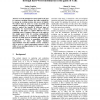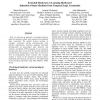12 search results - page 2 / 3 » Learning Complex Robot Behaviours by Evolutionary Computing ... |
AAMAS
2005
Springer
13 years 5 months ago
2005
Springer
Cooperative multi-agent systems are ones in which several agents attempt, through their interaction, to jointly solve tasks or to maximize utility. Due to the interactions among t...
SMC
2007
IEEE
13 years 11 months ago
2007
IEEE
—This paper discusses a new implementation of embodied evolution that uses the concept of punctuated anytime learning to increase the complexity of tasks that the learning system...
GPEM
2008
13 years 5 months ago
2008
In this work a cooperative, bid-based, model for problem decomposition is proposed with application to discrete action domains such as classification. This represents a significan...
CIG
2005
IEEE
13 years 11 months ago
2005
IEEE
Several attempts have been made in the past to construct encoding schemes that allow modularity to emerge in evolving systems, but success is limited. We believe that in order to c...
EH
1999
IEEE
1999
IEEE
Evolvable Hardware or Learning Hardware? Induction of State Machines from Temporal Logic Constraints
13 years 9 months ago
Here we advocate an approach to learning hardware based on induction of finite state machines from temporal logic constraints. The method involves training on examples, constraint...


